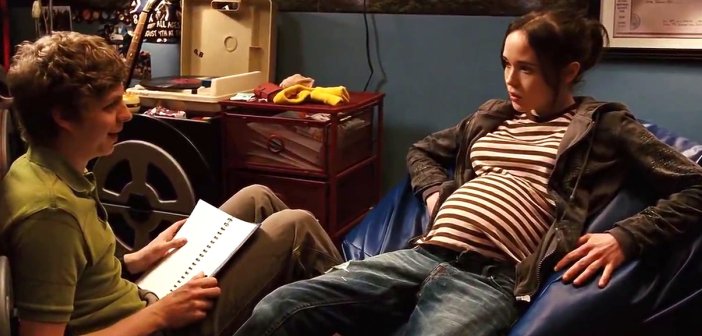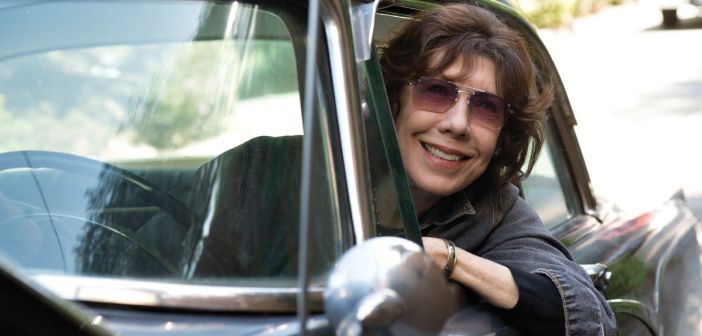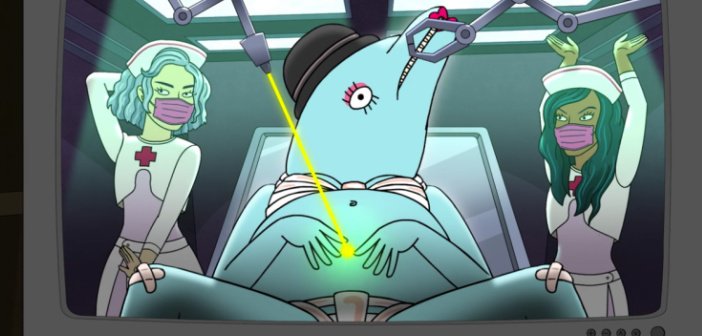Telling the Untellable : Abortion Onscreen
Television and cinema deals with every subject, including the untouchable – presenting fictionalised reflections of people’s real lives. In Ireland, our consumption has been heavily weighted to American output – we absorb their television and cinema as though it’s our own. Abortion was something we couldn’t speak about here, but we could glimpse its ‘normalness’ through post-Roe vs Wade US media. Pre-millennial contemporary accounts vary from Baby (Jennifer Grey) standing up to her father’s disapproval of Penny’s (Cynthia Rhodes) abortion in 1987’s classic Dirty Dancing, all the way to Elaine Benes (Julia Louis-Dreyfuss) dumping an eligible bachelor for being anti-choice on Seinfeld in 1994.
However, even if you discount stories taking place in the past – where abortion puts life in danger or ostracises you from society – modern examples can still appear a little dismal. Some recent popular films and TV shows have landed shy of the bullseye in representing real experiences, opting instead to either lecture or ignore. 2007 brought us the popular movies Knocked Up and Juno, both stories of unexpected pregnancies that represented abortion as an unapproachable option. For Knocked Up, this meant childishly referring to abortion as “the A-word” and “shmashmortion,” before never alluding to it again. In Juno, the titular character (Ellen Page) visits an abortion clinic that is dirty and badly run, fleeing before she can consider it further – presenting an extremely problematic experience with the process.

While film can take artistic licence, television shows are often slaves to immediate audience reaction, and pull much more ‘with the times.’ In a 2011 episode, The Walking Dead showed Lori (Sarah Wayne Collins) taking the morning after pill in an attempt to induce a miscarriage before instantly regretting it and throwing up the pills. It could be argued that a fictionalised story taking place in an apocalyptic world is no basis for discussion, but spreading myths about reproductive choices on primetime television is a huge disservice to viewers. In February 2014, political drama House of Cards had the strong figure of Claire Underwood (Robin Wright) admit to an abortion, but state publically that the pregnancy was a result of rape – giving an ‘acceptable’ reason, rather than doubling down on the radical notion that reasons are nobody’s business but the one making the choice. The body politic, indeed![pullquote]It could be argued that a fictionalised story taking place in an apocalyptic world is no basis for discussion, but spreading myths about reproductive choices on primetime television is a huge disservice to viewers.[/pullquote]
In July 2015, True Detective showed a conversation between a crime boss and his wife, Jordan (Kelly Reilly), as they attempt to start a family. Jordan breaks down and tells Frank that she has had three abortions – referring to them as ‘operations’ – in her 20s, which she worries have made her infertile. Frank is horrified, compounding societal panic of abortions, as well as presenting misinformation on the existence of a link between abortions and infertility.
All is not lost, however, with more and more honest accounts popping up in cinema and TV of real-life situations, where abortion is presented as an actual option. Obvious Child (2014) is… well… the most obvious example of this. The main character Donna (Jenny Slate) becomes pregnant, attends a family planning clinic, and when given her options answers directly; “I would like an abortion, please.” She discusses it openly in her comedy routine, and with her best friend and mother – both of whom have had abortions, and have honest discussions about the aftermath. 2015 gave us Grandma, the story of an 18-year old’s efforts to get enough money for an abortion – highlighting how much our choices can be affected by ability to pay or travel – with her supportive grandmother (Lily Tomlin) in tow.

On television, two incredibly popular shows with strong female cast members, portrayed abortion storylines. Grey’s Anatomy had already addressed abortion early in Season 2, and in Season 8 Dr. Christina Yang (Sandra Oh) makes a very certain decision to have an abortion. Despite the initial anger of her husband, Dr. Yang continues with both the abortion and her storylines, with the eventual support of those around her.[pullquote]From Family Guy to South Park, and Always Sunny in Philadelphia to Inside Amy Schumer, comedy represents a playing field where the ridiculousness of restrictions on speaking about abortion can be exposed and ridiculed.[/pullquote]
US hit series Scandal also approached abortion earlier in its run, in a May 2007 episode that featured the first example of modern abortion procedures being shown onscreen. In November 2015 the main character, Olivia, (Kerry Washington), has an abortion herself – in an episode that also marked a strong defence of Planned Parenthood funding in the US. Occupying less than a minute of screen time, the abortion is important as it takes place in the context of Olivia refusing the conservative finger-wagging ‘consequences’ generally associated with the procedure.
Comedy generally holds the mantle for speaking honestly, openly and sometimes harshly about our realities. It is anarchic and wild, and can often be the last bastion of free speech on untouchable topics – from Family Guy to South Park, and Always Sunny in Philadelphia to Inside Amy Schumer, comedy represents a playing field where the ridiculousness of restrictions on speaking about abortion can be exposed and ridiculed.

In fact, one of the strongest recent representations of abortion onscreen came from Bojack Horseman, a blackly comic interpretation of modern life featuring anthropomorphic horses and dogs. In a July 2016 episode, ‘Brrap Brrap Pew Pew,’ Diane (Alison Brie) and Mr. Peanutbutter (Paul F. Tompkins) fall pregnant, and Diane decides to have an abortion. Accidentally tweeting her decision from the account of a popstar dolphin, Sextina, (I know!) it becomes a public issue – especially when Sextina decides to run with it, and releases a pretty un-PC pop song to celebrate ‘her’ abortion. While Diane initially finds this distasteful, a fan she meets in the abortion clinic tells her that; “Getting an abortion is scary…with all the protesters out front and how you have to listen to the heartbeat and all, when you can joke about it, it makes it less scary.”
And then there’s Ireland. Galway Fringe recently screened a series of shorts that included Natasha Waugh’s Terminal, a short and telling conversation between two women at an airport gate, awaiting flights to Manchester for their abortion. The Galway Film Fleadh in July of this year saw the debut of Twice Shy, an exciting new feature by writer/director Tom Ryan – who received the ‘Rising Star’ award at the Irish Screen America Film Festival for his film. Twice Shy tells the story of Maggie (Iseult Casey) and Andy (Shane Murray-Corcoran), a boyfriend and girlfriend with an unplanned pregnancy making the trip from Ireland to London for an abortion. While not on general release, the film promises to explore the topic in a thoughtful manner without judgment – hopefully showing not just the journey, but the access to choice itself.
[iframe id=”https://www.youtube.com/embed/j0OaAz7N07k” align=”center” mode=”normal” autoplay=”no” maxwidth=”750″]
Landing hotly in the middle of a growing debate, this movie might just spark further discussion on the particularly Irish onscreen and off-screen relationship to abortion. For those who have gone through the process, seeing it represented realistically in cinema and television can be a relief – allowing them to discuss their own experiences in the guise of a fictional story. Talking about Scandal, one woman who had travelled for an abortion without telling many people commented that it helped normalise the process, and “…let me talk about abortion with people who I could never normally say the word to. It felt good to do it.”
Abortion needs to be shown onscreen because life’s realities should be reflected in our popular culture, and tough questions asked when necessary – saying abortion out loud and taking away its power lessens the taboo and brings it into our conversation. As Kerry Washington said, when pressed on Scandal’s abortion storyline:
…Not having those moments represented in media, we add to the idea that there’s something shameful to be talked about. It’s always important that our storytelling reflects the real experiences of human beings, because it allows us to not feel as alone.
Cinema and television offers an opportunity to explore and embrace the many and varied abortion stories people are living with today. Whether it’s through an animated horse, raucous comedy, serious drama, or even the Rose of Tralee, abortion is a truth that should be represented on our screens and in our conversation.
The Abortion Rights Campaign’s fifth annual March for Choice, is on the 24th September. Our theme is Rise and Repeal because we feel like enough blood has been shed, enough women have been hurt. We must Repeal the 8th amendment so we can access free, safe and legal abortion
Penned by Sarah Griffin on behalf of The Abortion Rights Campaign
